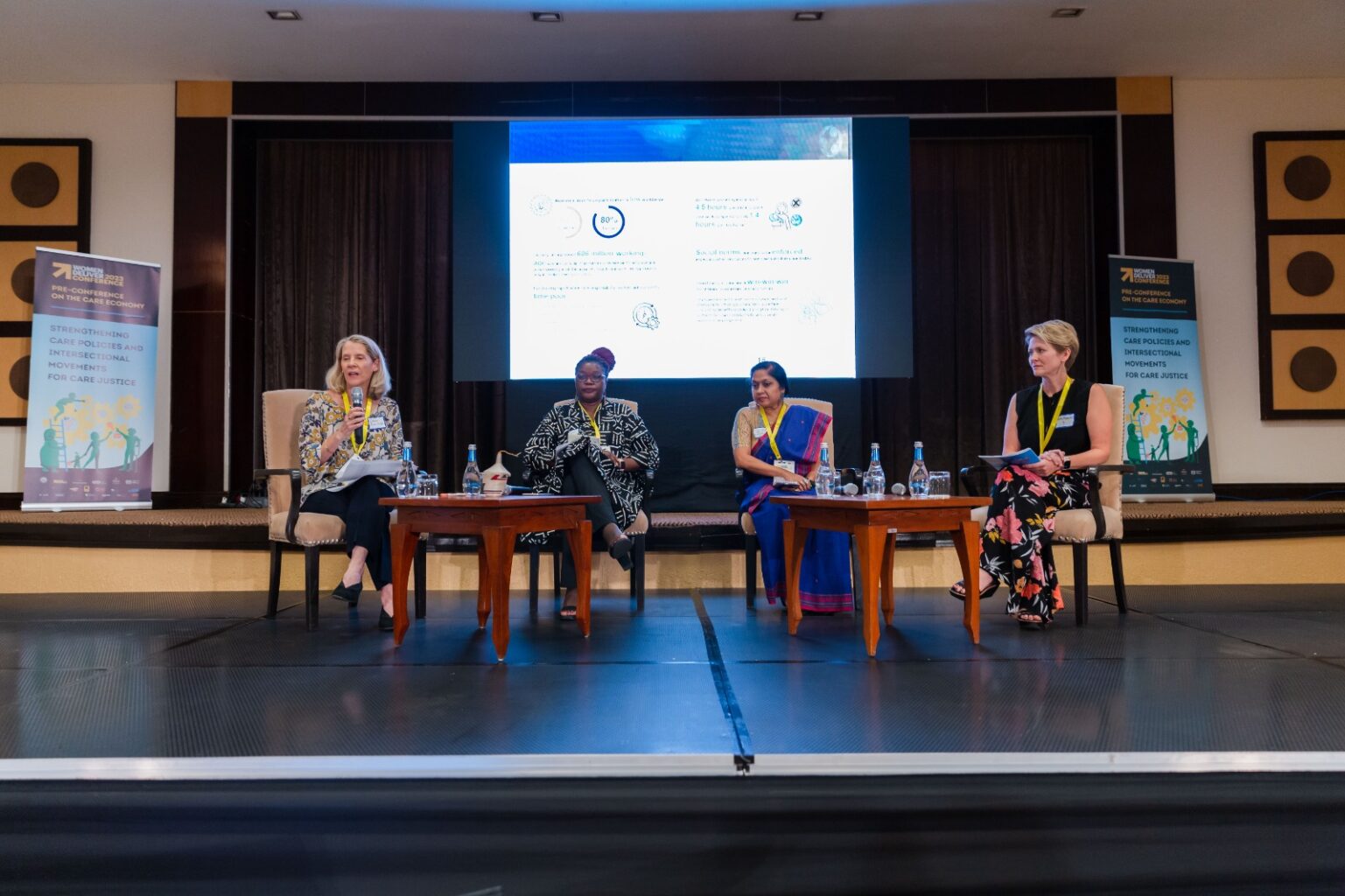Working Toward Sustainable and Inclusive Care Systems
Kate Francis is a technical director of Cadmus’ economic engagement and private sector development practice in the international development division. Kate is a gender expert with over 15 years of experience designing and implementing women’s empowerment, gender integration, and social inclusion programs.
In July 2023, Cadmus’ Kate Francis joined over 6,000 other gender equality advocates and feminist activists in the City of a Thousand Hills for the tri-annual Women Deliver Conference. Held in Kigali, in close partnership with the Government of Rwanda, the gathering attracted diverse delegates from every region and discipline related to gender equality and women’s rights. It also marked the first time a Women Deliver conference was held in Africa, enabling an especially large cohort from the continent to join in person and showcase the progress, challenges, and priorities in the region.
Cadmus joined a dynamic group of fellow co-sponsors led by WeProsper, Women Deliver, International Labour Organization, Center for Global Development, and The Asia Foundation to organize the Pre-Conference on the Care Economy that took place in conjunction with the Women Deliver Conference. The pre-conference brought together 100 experts from around the world to discuss current debates and evidence on the state of care delivery across regions and focus areas, including climate change adaptation, promoting decent work, harnessing entrepreneurship and technology, and engaging men and boys. The pre-conference also explored promising entry points such as subnational or municipal care policies and programs, which can serve as incubators to develop proof of concept for strategies that can later be rolled out at the national level.

As a leading advocacy expert on the care economy, Kate moderated an engaging and forward-looking panel “Elevating Care Across Global and Regional Platforms” with Dr. Jemimah Njuki (Chief of Economic Empowerment, UN Women), Laura Rawlings (Lead Economist, World Bank Gender Group), and Sumitra Mishra (Executive Director, Mobile Creches India). Panelists discussed how to catalyze government action and commitments by elevating care in global forums such as the G7, G20, and the United Nations General Assembly—including how to ensure the priorities of service providers and frontline care workers are reflected in global policies. Jemimah noted the momentum around acknowledging the critical role care plays in societies and economies is increasing, as illustrated by the UN General Assembly adoption of the new International Day of Care and Support (October 29). Laura shared new initiatives designed to promote care-related investments at the World Bank, including the Invest in Childcare Initiative, the newly released draft Gender Policy, and a forthcoming thematic note on the care economy. Sumitra shared how fostering G20 priorities around care has also cast a spotlight on the important work being done by domestic care movements in host countries—and the importance of investing in the policy engagement capacity of frontline care providers to ensure policies reflect their priorities.
The pre-conference sponsors are applying learnings from the day-long discussions to develop a forthcoming global roadmap for action to help coordinate and crowd in support for collective action on fostering policy solutions, programming, and financing for care services and infrastructure.
Intersectional Strategies to Advance Gender Equality
The Women Deliver Conference facilitated engagement between attendees in a dynamic mix of side events, concurrent sessions, and serendipitous chance meetings with longtime colleagues and new connections. Three takeaways stand out from the rich discussions encompassed in each conference session.
- Care is everywhere. Across diverse topics, virtually every session acknowledged how unpaid and unrecognized care work creates, complicates, or hinders progress on that particular issue. Unpaid and poorly paid care work performed predominantly by women is an urgent and persistent barrier to achieving gender equality and inclusive economic growth, and it is worthy of concerted and sustained investment. We need to continue to move from acknowledgement to planning and implementation of concrete actions at scale.
- No matter what we work on, we all must be climate activists. Ellen Dorsey of the Wallace Global Fund said it best: “We are the first generation to fully understand that climate change is urgent and the last generation that can do something about it before it’s too late.” Only 2% of climate financing goes to women and climate financing mechanisms are not designed to reach the women who are bearing the brunt of the climate crisis. Climate financing cannot be debt, because that simply means that women are paying it back through increased unpaid care work. Panelists called for decentralized solar energy systems as a transformative gender-sensitive climate solution, as well as land reform to empower women farmers—who are responsible for 65% of agricultural output, but only own 10% of the land. From transportation to trade, there are gender-sensitive climate strategies we can and must prioritize, “before it’s too late.”
- If you keep your head down and stay in your lane, you’re missing out. Seeking out intersections and collaboration are potent strategies for breaking out of “business as usual” and identifying new ways of working through new partnerships beyond the usual suspects. Our work at Cadmus hinges on integrating gender considerations and strategies across a diverse set of issue areas—from trade and investment to energy and transportation infrastructure—to establish impactful, long-lasting solutions that drive improved outcomes across economies and societies. The Women Deliver Conference brought together thousands of activists with a shared sense of urgency and created a valuable space to build stronger connections across common ideals. Translating ideals into action by leaning on newfound allies is how we move from attending a conference to fueling a movement that has its sights set on a feminist future where new climate solutions, more equitable economic systems, and more caring societies mean safer, more meaningful lives for all of us.
Contact Kate Francis to learn more about Cadmus’ work in building inclusive care systems.